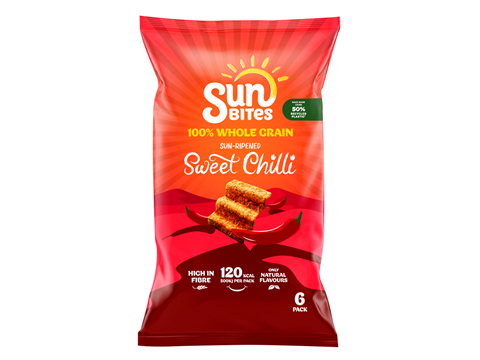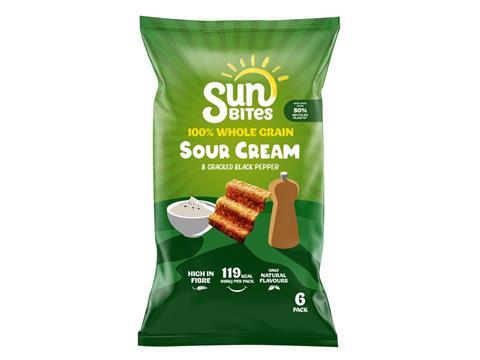
INEOS Olefins & Polymers Europe, PepsiCo and Amcor have teamed up to launch new snack packaging for Sunbites crisps containing 50% recycled plastic.
The new packaging was launched in the UK and Ireland for PepsiCo’s snack brand Sunbites in late 2023. The packaging is made by recycling plastic waste into food grade packaging material using an advanced recycling process, which the companies describe as a complementary approach to mechanical recycling, which enables the recycled materials to satisfy the demanding EU regulatory requirements for applications such as food contact packaging, contact sensitive and medical devices.
The collaboration included multiple partners from across the supply chain. GreenDot ensured the procurement and supply of post-consumer plastic packaging waste, which was converted into TACOIL (pyrolysis oil) using Plastic Energy’s technology, and INEOS used this pyrolysis oil as an alternative to traditional fossil feedstock to produce recycled propylene, before turning it into virgin-quality recycled polypropylene resin at its plant in Lavera, France.
IRPLAST reportedly uses the new resin to turn existing plastic packaging designs into new packaging films containing 50% of post-consumer recycled materials and meeting the food contact performance requirements. Amcor transformed these films into printed packaging that delivers the same technical performance for PepsiCo.
Using these new polypropylene films, PepsiCo launched the Sunbites packaging in the UK. The partnership is part of PepsiCo Positive (pep+), the company’s end-to-end transformation, which aims to eliminate virgin fossil-based plastic in crisp and chip bags in Europe by 2030.

The recycled polymer content is certified under the International Sustainability and Carbon Certification (ISCC PLUS) scheme, an independent third party who certify it has been tracked through the production process using mass balance principles and the claim being made is accurate.
The upcoming EU Packaging and Packaging Waste Regulation (PPWR) is expected to set out ambitious targets for recycling packaging waste for 2025 and 2030 across a range of materials and recycled content targets for plastics. INEOS says the achievement demonstrates that advanced recycling technologies can play a critical role in meeting the growing demand for the safe, circular use of recycled materials in food contact products, helping the EU to achieve its 10% recycled content objective for contact sensitive plastic packaging by 2030.
In the last year, developments in recycled content included Solvay and Hegen’s partnership to bring ‘the first baby bottle made with recycled content’ to the market, made from non-fossil feedstock content and apparently third-party mass balance certified and free of artificial pigments, phthalates and bisphenols, such as BPA.
It also saw air up launch a new line of reusable bottles made from Eastman Tritan Renew, reportedly consisting of 50% ISCC-certified recycled content sourced from a molecular recycling technology, thought to utilize up to 88% less plastic than single-use bottles.
If you liked this story, you might also enjoy:
The Brief: How viable is biorecycling for plastics?
Report: How the top brands are progressing on packaging sustainability
The Brief: Using ocean-bound plastic in packaging – how, why and should we?














No comments yet